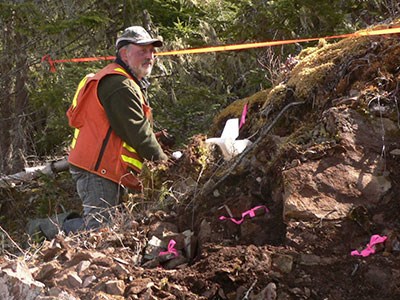Persistence and effort paid off for Rudy Wahl.
The Marathon-area prospector was recognized by his peers this past spring for his rich Prairie Lake niobium and phosphate discovery.
Wahl, 58, one of the property’s owners, signed an option agreement with Montreal’s MDN, which earned him the Bernie Schnieders Discovery of the Year award by the Northwestern Ontario Prospectors Association.
He’ll add to that Lifetime Achievement Award he received from the association in 2012.
Last year, Wahl discovered numerous high grade niobium, tantalum and phosphate occurrences on Prairie Lake, 45 kilometres north of town.
At the awards ceremony in Thunder Bay in April, Wahl said he was asked by Don Hoy, one of the co-founders of chromite in the Ring of Fire, about how he learned about his craft.
“You gotta have the drive. If you find something, figure out what it is.”
Good prospectors invest their time in the field, said Wahl.
“If you’re not out there, you’re not finding anything and you’re not making any discoveries. And look at the big picture. Look outside the box.”
Prospecting is not for the half-hearted. Perseverance leads to success.
“Do you know how many times in the last 24 years I wanted to throw in the towel? Many times. The (exploration financing) market in the last three or four years is a major problem. You’ve got good projects and discoveries, but the money’s not there.”
Wahl said he’s constantly pushing his business partner, Mike Dorval, to spend money to keep sampling on their claims.
“Money is tight, but if you sit still nothing is going to happen.”
Wahl’s stomping grounds are the Marathon-Hemlo area.
Lake Superior’s north shore is one of Canada’s most prolific gold mining regions and that was the scene of a furious staking rush in the 1980s.
After working for 20 years at Red Lake’s Dickenson Mine and the Williams Mine in Hemlo, the German-born Wahl settled in Marathon where he was introduced to prospecting in 1989.
He devoured all the prospecting and geology courses he could, and still studies to stay current on provincial mining legislation and minerals.
Over the course of a year, he’ll stake between 1,000 and 2,000 claims, spending between $50,000 and $100,000 on prospecting.
When he strikes an option agreement, a fair chunk of change is folded back into his rojects.
Through his website, www.renegadeisp.com/~rwahl, Wahl actively promotes his properties which are available for option.
With his Prairie Lake discovery, the Ministry of Northern Development and Mines sampled it to verify his discoveries and he hosted a number of junior mining suitors until MDN stepped up and made a deal.
The difference between success and failure in prospecting is one’s knowledge of all facets of the profession.
“Many (prospectors) don’t have the knowledge on how to promote themselves. They don’t have the knowledge about geology and structure and minerals, and how they all work together.”
Whether Prairie Lake is a career pinnacle is difficult for Wahl to say, since he’s more excited about his diamond and rare earth prospects.
“My goal is I want to find a mine and I think I may have found one (with Prairie Lake). It looks very promising. At the same time the diamond potential is very huge here.”
With the greying of the industry, Wahl is concerned that prospectors are becoming a “dying breed” and he wants to do more to get young people involved, even as a weekend hobby.
“I seldom go out by myself. I take young people with me who like to be out in the bush and like to learn. I teach how to recognize different minerals.”
Wahl wants to work with the Town of Marathon and the school boards to line up a prospectors course; teaching geology and basic bush skills for students between 12 and 16.
Despite its challenges, what he finds still enjoyable about the profession is the learning aspect and constantly building on his knowledge base on the path to discovering something new.
“It’s not always the same rock I’m touching.”




